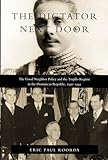The dictator next door : the good neighbor policy and the Trujillo regime in the Dominican Republic, 1930-1945 / Eric Paul Roorda.
Material type: TextLanguage: English Series: American encounters/global interactionsPublication details: Durham: Duke University Press, 1998.Description: xii, 337 pages, [18] pages of plates : illustrations ; 25 cmISBN:
TextLanguage: English Series: American encounters/global interactionsPublication details: Durham: Duke University Press, 1998.Description: xii, 337 pages, [18] pages of plates : illustrations ; 25 cmISBN: - 082232234X (acid-free paper)
- 9780822322344
- 0822321238 (pbk. : alk. paper)
- 9780822321231
- Trujillo Molina, Rafael Leónidas, 1891-1961
- United States -- Foreign relations -- Dominican Republic
- Dominican Republic -- Foreign relations -- United States
- Dominican Republic -- History -- 1930-1961
- República Dominicana -- Relaciones exteriores -- Estados Unidos
- Estados Unidos -- Relaciones exteriores -- República Dominicana
- República Dominicana -- Historia -- 1930-1961
- República Dominicana -- Historia -- Era de Trujillo, 1930-1961
- 327.7307293
- 118 E 183.8 R779d 1998
| Item type | Current library | Home library | Collection | Shelving location | Call number | Copy number | Status | Date due | Barcode |
|---|---|---|---|---|---|---|---|---|---|
 Libro
Libro
|
Biblioteca Juan Bosch | Biblioteca Juan Bosch | Recursos Regionales | Recursos Regionales (2do. Piso) | 118 E 183.8 R779d 1998 (Browse shelf(Opens below)) | 1 | Available | 00000005298 |
Browsing Biblioteca Juan Bosch shelves, Shelving location: Recursos Regionales (2do. Piso), Collection: Recursos Regionales Close shelf browser (Hides shelf browser)
Includes bibliographical references (pages [307]-325) and index.
Dominican history, the United States in the Caribbean and the origins of the good neighbor policy
The Dominican revolution of 1930 and the policy of nonintervention
The bankrupt neighbor policy: depression diplomacy and the Foreign Bondholders Protective Council
What will the neighbors think? Dictatorship and diplomacy in the public eye
Genocide next door: the Haitian massacre of 1937 and the Sosua Jewish refugee settlement
Gold braid and striped pants: the culture of foreign relations in the Dominican Republic
Fortress America, Fortaleza Trujillo: The Hull-Trujillo Treaty and the Second World War
The good neighbor policy and dictatorship
This book "focuses on the relations between the U.S. and the Dominican Republic following Rafael Trujillo's seizure of power in 1930. Examining the transition from the noninterventionist policies of the Hoover administration to Roosevelt's Good Neighbor policy, Roorda blends diplomatic history with analyses of domestic politics in both countries not only to explore the political limits of American hegemony but to provide an in-depth view of a crucial period in U.S. foreign relations. Although Trujillo's dictatorship was enabled by prior U.S. occupation of the Dominican Republic, the brutality of his regime and the reliance on violence and vanity to sustain his rule was an untenable offense to many in the U.S. diplomatic community, as well as to certain legislators, journalists, and bankers. Many U.S. military officers and congressmen, however--impressed by the civil order and extensive infrastructure the dictator established--comprised an increasingly powerful Dominican lobby. What emerges is a picture of Trujillo at the center of a crowded stage of international actors and a U.S. government that, despite events such as Trujillo's 1937 massacre of 12,000 Haitians, was determined to foster alliances with any government that would oppose its enemies as the world moved toward war




There are no comments on this title.